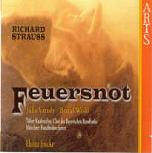Richard Strauss’ first opera, Guntram, premiered in Munich, was a failure. And so Feuersnot (“Fire Emergency,” or “Lack of Fire”), his second, was a satire of that city’s people. Set in 12th-century Munich, the story begins with the town’s children who are looking for wood in order to burn their summer solstice bonfires. Konrad, a stranger and apprentice to a sorcerer, allows them to use wood from his house. Konrad loves Diemut, the mayor’s daughter, and he kisses her without her permission. To get back at him, she plans a trick: She lowers a basket from her balcony and invites Konrad in; half way up, she abandons him and leaves him hanging there, to the mockery of the townsfolk. In retaliation, Konrad calls upon the sorcerer to extinguish every fire in town (a town that “scorns the power of Eros”), decreeing that none shall be lit until Diemut acknowledges her love for him. With the prodding of the local burghers, she eventually does, and the fires are re-lit (fire = passion and love) and everyone is happy.
The slap in the face is to the people of Munich for rejecting both Strauss and his idol, Wagner–and indeed, Feuersnot contains many Wagnerian references. When a giant is mentioned, the “Fafner” motif is heard in the orchestra; later, during a long monolog of Konrad’s, he refers to a “noble ruler” and the “Valhalla” motif shows up; bits of Flying Dutchman occasionally can be heard, and even in the text there are puns on Wagner’s name. Konrad clearly is Strauss; the sorcerer he calls upon is Wagner. None of this makes the opera any more entertaining, by the way, and it’s a work that despite a pretty waltz and a fine duet for our lead soprano and baritone, resolutely refuses to become either interesting or beautiful until near the end, when an orchestral interlude accompanying the relighting of the fires suddenly reminds us of the Strauss we love. The orchestra is big-Strauss-sized, but only here, near the opera’s end, do we get that singularly rhapsodic feeling he imparts at his best.
Aside from a fine orchestra and chorus (including an excellent children’s choir) and a conductor who can hold the 90-minute work together, the opera needs only a fine soprano and baritone to succeed, and all the ingredients are in place on this 1986 recording. Baritone Bernd Weikl has the lion’s share of the solo music, and he handles the role of Konrad well. Konrad is somewhat of a philosopher and can be long-winded, but Weikl’s smooth delivery and attention to the text keep our interest. The remarkable Julia Varady is Diemut, singing radiantly and changing from proud, arrogant girl to woman-in-love before our eyes (ears?). And the rest of the cast is very good under Heinz Fricke’s tight leadership. The libretto is printed only in German, but the booklet contains a good synopsis and accompanying notes. This is undoubtedly for Strauss completists, but it’s interesting enough in its own right. [3/21/2005]
































